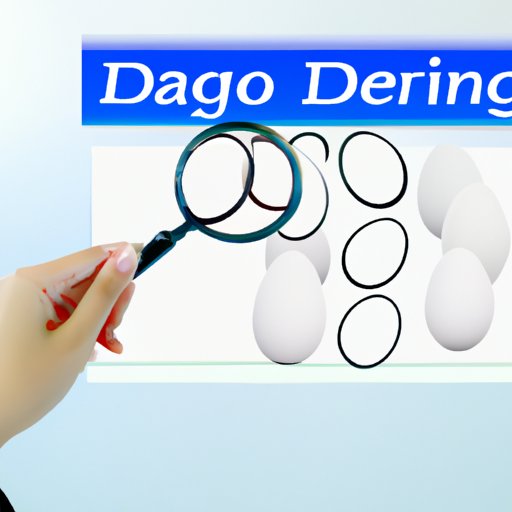Analyzing the Egg Donation Market: How Much Can You Get for Selling Your Eggs?
Deciding to donate your eggs is an important decision. Not only will it require you to go through a series of tests and screenings, but it may also have an effect on your future fertility. Additionally, many people are interested in the financial aspect of donating their eggs. How much can you get for selling your eggs?

Overview of the Egg Donation Market
Egg donation is a process where a woman donates her eggs to be used in assisted reproductive technology (ART). ART is used to help couples who cannot conceive naturally become pregnant. Donated eggs are fertilized with sperm from the intended father or a donor, and then implanted into the mother’s uterus. The egg donor is usually compensated for her time and effort.

Factors That Affect How Much You Can Get for Selling Your Eggs
There are several factors that affect how much money you can make from donating your eggs. These include:
- Your age – Most clinics prefer donors who are between 21 and 33 years old.
- Your medical history – Your medical records will be reviewed by a doctor before you can donate your eggs.
- Your lifestyle – Clinics may require you to lead a healthy lifestyle, abstain from smoking and drinking, and take certain medications or supplements.
- Your location – Egg donation agencies are more prevalent in some areas than others, so the amount of money you can make may vary depending on where you live.
Common Payment Ranges for Egg Donors
The amount of money you can make from donating your eggs varies widely, but most clinics offer payments ranging from $5,000 to $10,000. Some clinics may pay more or less depending on the donor’s qualifications. It’s important to note that these amounts do not include any expenses associated with the egg donation process, such as travel costs, laboratory fees, and medication costs.
Exploring the Financial Benefits of Donating Your Eggs
In addition to the payment you receive for donating your eggs, there are other financial benefits to consider. For example, if you’re a student, you may be able to use the money you make from donating your eggs to help pay for tuition and other educational expenses. Additionally, if you’re self-employed, you may be able to deduct some of your egg donation-related expenses on your taxes.
Tax Implications of Donating Your Eggs
It’s important to note that the money you receive from donating your eggs is considered taxable income. This means that you’ll need to report it on your tax return and pay taxes on it. However, you may be able to deduct certain expenses related to your egg donation, such as travel costs and medical expenses, from your taxable income.

A Guide to Getting Paid for Selling Your Eggs
If you’ve decided to donate your eggs, there are several steps you’ll need to take in order to get paid. Here’s a brief overview:
Understanding the Screening Process
Before you can start the process of donating your eggs, you’ll need to undergo a series of screenings. These screenings are designed to ensure that you’re a suitable candidate for egg donation. Generally, these screenings include a physical exam, blood work, and psychological testing.

Finding an Egg Donation Clinic or Agency
Once you’ve passed the screenings, you’ll need to find a clinic or agency that specializes in egg donation. There are several online resources that can help you find a clinic or agency in your area, as well as information about their fees and payment policies.
Negotiating Payment
When you’ve found a clinic or agency that you’d like to work with, it’s important to negotiate a fair payment for your services. This can be done by discussing your qualifications and experience, as well as researching the going rate for egg donors in your area.
What to Expect When Selling Your Eggs: A Comprehensive Look at the Process and Payouts
Once you’ve negotiated a payment amount, you’ll need to understand what to expect during the egg extraction process. Generally, this includes undergoing a few more tests, taking medications to stimulate egg production, and having the eggs extracted from your ovaries. After the eggs have been extracted, you’ll need to take medications to prevent infection and follow up with your doctor.
Payment Options
Most clinics and agencies will pay you in one lump sum after the egg extraction procedure is complete. However, some clinics may offer payment plans or other options, such as payment in installments. Be sure to discuss all payment options with your clinic or agency before agreeing to donate your eggs.

The Pros and Cons of Selling Your Eggs for Money
While donating your eggs can be financially beneficial, there are also several potential drawbacks. It’s important to weigh the pros and cons carefully before making a decision.
Advantages of Donating Your Eggs
- Financial compensation – You can receive a substantial amount of money for donating your eggs.
- Helping others – By donating your eggs, you can help someone create a family.
- Potential tax benefits – You may be able to deduct some of your egg donation-related expenses on your taxes.
Disadvantages of Donating Your Eggs
- Time commitment – Donating your eggs requires a significant amount of time and effort.
- Medical risks – There are potential medical risks associated with the egg donation process.
- Emotional impact – Donating your eggs can have an emotional impact, both for you and the recipient.
Ethical Considerations of Egg Donation
In addition to the potential financial and medical implications of donating your eggs, there are also ethical considerations. Many people have strong opinions on the subject of egg donation and it’s important to take these into account when making your decision. It’s also important to understand the legal implications of donating your eggs, as laws vary from state to state.
(Note: Is this article not meeting your expectations? Do you have knowledge or insights to share? Unlock new opportunities and expand your reach by joining our authors team. Click Registration to join us and share your expertise with our readers.)
